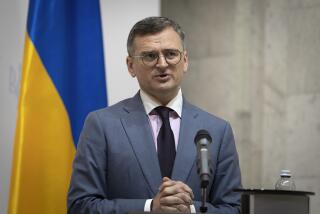Yeltsin Shuffles Deck, but Cards Are the Same
- Share via
MOSCOW — A month after he shocked the world by firing his entire Cabinet and demanding a “new team,” Russia’s erratic President Boris N. Yeltsin revealed his new government Tuesday, and it was little changed from its predecessor.
It had taken Yeltsin a month to force grumpy lawmakers to accept his choice for prime minister--the young, little-known technocrat Sergei V. Kiriyenko, who is charged with speeding up economic reform. The Communist-led lower house of parliament, or Duma, finally knuckled under Friday, approving the bespectacled Kiriyenko and opening the way for a new government to be named.
Despite all the sound and fury, most of the previous government’s forward-looking technocrats survived.
Boris Y. Nemtsov, a liberal who had been one of two first deputy prime ministers until March, was reappointed as one of two deputy prime ministers.
He lost his previous, seemingly more prestigious title--a designation that disappeared--apparently in an attempt to appease the Duma with a suggestion that Nemtsov, the boy wonder of the market-reform policy who is hated by lawmakers, had somehow been demoted.
But Nemtsov, widely seen as Kiriyenko’s patron and ally, quickly made clear that the change in title meant little. “Naturally, the sphere of my competence will extend,” he said.
The other deputy prime minister to be named was, like Nemtsov, a fast-rising reformer from the provinces, Viktor Khristenko, 40, who had recently been called to Moscow as deputy finance minister. Nemtsov said a third deputy prime minister would be appointed.
Among the ministerial reappointments were: Mikhail M. Zadornov as finance minister, Igor D. Sergeyev as defense minister, Sergei K. Shoigu as emergencies minister, and Nikolai Y. Aksenenko as railways minister. Yeltsin also confirmed acting interior minister Sergei V. Stepashin in the job he has been doing for the last month.
Markets reacted with a resigned shrug to the end of Russia’s latest political mini-upheaval. “It’s nice to have it all sorted, but I don’t think there were too many people who were overly worried that it wouldn’t sort itself out,” one London fund manager told Bloomberg news service. “The new government doesn’t surprise me.”
Only the two big men of the old government were notable by their absence: Former Prime Minister Viktor S. Chernomyrdin--whose quiet presidential ambitions were believed to have unnerved Yeltsin and prompted the mass firings in March--and Anatoly B. Chubais, the former first deputy premier who had been regarded in the West as the leading light of Russia’s economic-reform program.
An ugly behind-the-scenes struggle for power between these two men, and the bankers and businessmen in each of their camps, had characterized the year they shared government.
Gone too was the old Cabinet’s one odd-man-out hard-liner: former Interior Minister Anatoly S. Kulikov, a tough, law-and-order boss in the old Communist mold who pursued all those he viewed as miscreants--whether Chechen guerrillas, corrupt businessmen or Moscow prostitutes--with maximum ferocity.
Their fall from grace was marked by corruption allegations in the media, as enemies who had been too nervous to pursue their powerful prey until now took courage and moved in for the kill.
Kulikov had been pointedly singled out by Yeltsin in March as one minister who would not be returned to power. A flurry of newspaper allegations based on leaked reports and anonymous sources has linked Kulikov and other ministry top brass to the large-scale siphoning of money intended for use in Russia’s 1994-96 war with rebel Chechen nationalists.
Chubais, who was tainted in a corruption scandal last fall, was further humiliated Tuesday in a Moscow court. Having dithered for months over a verdict while Chubais was still in office, the court finally rejected his slander suit against a radio station, Ekho Moskvy, and a Russian journalist who had suggested his acceptance of a big book advance in 1997 was a disguised bribe.
Chubais and Chernomyrdin are both in a position to rise above such indignities. Chubais is now one of 14 board members of Russian electricity giant UES, elected by shareholders early this month and expected to be approved as a director next month. Chernomyrdin, a former boss of and substantial shareholder in the giant Gazprom energy firm, has publicly declared himself a candidate for the Russian presidential race in 2000.
More to Read
Sign up for Essential California
The most important California stories and recommendations in your inbox every morning.
You may occasionally receive promotional content from the Los Angeles Times.













